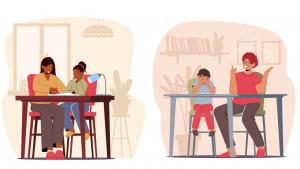It has been a huge honour of mine to work with disabled children and young people to develop the report “We all have a voice”: Disabled children’s vision for change.
A striking theme to emerge from the research is children’s concern for their parents, carers, and families. Children’s testimonies reveal the immense pressure the system can place on families, with getting the support their child needs often a very involved process. There is also often a lack of support for helping families better manage their child’s impairment, such as adaptations to home infrastructure and hiring carers to help with household duties or take the children out to school, play or other activities. Children are clearly grateful for their parents’ unconditional support, but worry that this is putting too much stress on them.
“My mum had to do a lot of work to get me the help I need. She had to give up her job to support me” – Boy, 13, attending a school for deaf children (The Big Ask).
“My mum is trying to get me support for my bad anxiety attacks and ADHD but everyone she contacts tells her to contact another place and she is going round in circles” – Boy, 12, (The Big Ask).
It is very disheartening to hear children use combative language to describe what can be an adversarial process to get help for their impairment or health condition, such as getting an EHCP or an appropriate school place. Families can be forced to enter protracted complaints processes, mediation, tribunals and court proceedings with a range of services – for example schools, local authorities and children’s social care.
Government statistics show that the number of registered SEN appeals to HM Courts & Tribunals Service in the academic year 2021/22 – 11,000 – was 29% higher than the previous year. Of the cases where an outcome was reached by the tribunal in 2021/22, 96% were in favour of the appellant – that is, the families of disabled children. Statutory services often feel as though their hands are tied by huge backlogs and waiting lists, and a lack of resource and available local specialist support. Sadly, this leads children to feel as though they are ‘fighting a battle’.
“I wish it was easier to go to a school that I liked, but mum and dad are very sad that they have to work hard to fill forms in, and fight to get me what I need” – Boy, 10 (The Big Ask).
“My EHCP, it took 3 years to actually get one, it got pushed back. My parents and [special school] had to fight for us to get one” – Boy, aged 16, attending a special school.
This often has huge costs for the family, including legal fees and potentially having to pay for private assessment, advice, treatment and care in the interim. Some families will get into debt to be able to afford the support their child needs. The stress and financial pressure involved in accessing support can take its toll on the wellbeing of the whole family.
“My mum and dad spent a lot of money for me to see therapists to help me. School didn’t do any of that. I’m worried for people like my brother because he has severe learning disabilities and my mum and dad are always trying to get him the right help” – Girl, 13 (The Big Ask).
Children and their families are experts in their own experiences, and must be listened to, supported, and treated with respect. A child and/or a parent’s unmet needs impacts on the whole family, but there remains a gap in services which respond to this reality.
It is critical that support services work with the whole family in a joined-up way. I want to see an inclusive Family Hub in every area – with local schools, GPs, and health visitors in the neighbourhood working together as part of a local network, and making better use of the school estate. Children and families reaching the threshold for support in one element of the system must also get support from other services.
Through taking a holistic approach and ensuring every family member is supported in the way they need – children can enjoy their childhoods, and not worry that their care is burdensome on the people who look after them.
For more on how we can support disabled children through a whole family approach, please see my Family Review.





